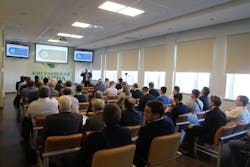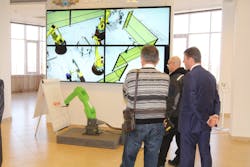Globalization is the key for redeveloping the economy and the technology for new business models, so industry is considering new targets to create and produce locally with small batches. Modern technology offers the possibility to do that and we can see flexible automated productions; the main thing is to produce small quantities to meet consumption demands. This new trend was named as Industry 4.0, which is not only a new name or not only new software for design and production, it is new infrastructure.
Never before we have seen so many complicated production lines in so many places, and not had the skills for service staff and a way to analyze so much data. A key point to support new industry is to have all information about production equipment, processes, and so on in one place, and to possibly get telecommunication technologies with new tools like augmented reality (AR) and artificial intelligence (AI). Implementation of such ambitious targets is possible with standardization. The Planning Domain Definition Language (PDDL) is an attempt to standardize AI planning languages. Worldwide leading corporations are applying telepresence in their production to maintain and support equipment in hundreds of factories worldwide.
Laser cutting technology company VNITEP (vnitep.ru) has been producing laser cutting machines, under the name NAVIGATOR, for over 10 years. The NAVIGATOR has linear drives and the company’s own computer numerical control (CNC) system was designed for remote control and diagnostics. An important feature of this CNC is technological support. NAVIGATORs are installed and working in Russia, Europe, and the U.S. at JMS Metal Services (Decatur, Alabama) and remote customer support helps users to achieve maximum efficiency. With customers’ production facilities in different geographic locations, it is very important to support them quickly, so process monitoring can help to collect data and optimize parameters. In some cases, this optimization reduces replacement parts cost more than 20%, and these services help to optimize the machines’ maintenance and support management at different levels.
The Engineering Center of Lobachevsky University (ECLU; enc-unn.ru) in Nizhny Novgorod, Russia, was nominated in a competition organized by Expocenter for developing a remote support system for different automation solutions. Nizhny Novgorod is one of the most industrialized cities in Russia; located on the Volga River, it had a large manufacturing tradition before the Russian Revolution in 1917. In May 1929, the Soviet Union signed an agreement with the Ford Motor Company, under which the Soviets agreed to purchase $13 million worth of automobiles and parts, while Ford agreed to give technical assistance until 1938 to construct an integrated automobile-manufacturing plant at Nizhny Novgorod. Gorkovsky Avtomobilny Zavod (GAZ) is part of JSC Russian Machines Corporation and has the largest, commercial transport production capacity in Russia. After the Second World War, a nuclear center was located in the Nizhny Novgorod area, employing a significant number of scientific people. As a result, Lobachevsky University has a good R&D base.
As an example, Itseez (opencv.org/intel-acquires-itseez), an expert in computer vision (CV) algorithms, was started at Lobachevsky University and later was acquired by Intel in 2016 to develop smart and connected devices. ECLU has an ambition target to create remote service support systems that can help small- and medium-size companies reduce hardware maintenance cost. A startup is developing algorithms for reducing necessary time during diagnostics in case of an emergency stop due to technical reasons. For example, the production line was stopped due to some technical reason and the maintenance staff started to find explanations in different manuals as to why it happens. Sometimes, they need help to fix the problem over several hours and they get support from suppliers. During this time, production revenue is lost, making it a more-expensive service—so ECLU is developing AI algorithms that can help to minimize time in such cases and give necessary information in operator AR glasses.
Fanuc is planning to open an R&D center in Skolkovo, Russia, so startups like ECLU will get a chance to test solutions with Fanuc’s products. The next step for ECLU is to create an AR manual marketplace where partners can place their manuals for remote support. Global producers have the possibility to optimize production equipment services, thanks to such solutions like that of ECLU. This service can be integrated with a customer’s IT infrastructure, like SCADA, for more-efficient technical staff training. The industrial marketplace needs more services for increasing efficiency; big data analytics can be used for more-efficient maintenance and to possibly organize service jobs when needed. All these service possibilities are making production more reliable in the global economy.
Vladimir Okatiev, a scientific entrepreneur from Nizhny Novgorod, sees the potential in developing new market segments for remote assistance, using natural language. The European Commission estimates a market for industrial applications of AI, big data manufacturing, and the Industrial Internet of Things (IIoT), with overall AI impact potential.
A lot of cases with very simple technical issues, due to missed skills of a service technician who makes mistakes, lead to financial losses. This could be a situation to augment human ability with technical support. Traditionally, natural language processing (NLP) is used in medicine for document processing and structuring, and it can help service staff faster analyze a lot of technical manuals and instructions in combination with errors from robot and programmable logic controllers (PLCs). Further, NLP can be a powerful tool that can help to minimize service staff mistakes in different productions.
PDDL language can help make clean structures for different data types for expressing the familiar semantics of actions. It was first developed by Drew McDermott, a U.S. scientist from the Massachusetts Institute of Technology (MIT). The practical issues in using PDDL are to develop services for industrial companies to support the technical staff and minimize mistakes during equipment repair after experiencing a crash or another emerging situation. Experience shows that the most important thing is to make the correct first steps after a situation occurs. Minimizing problems is the reason for quickly analyzing a lot of documents and checking to avoid further problems.
The European Commission estimates the industrial applications of AI and big data market may be €200 billion by 2030. It is quite a new area for businesses and it takes some time for adaptation. Business and Industry 4.0 can be interesting areas for investors and new startups.
Worldwide leading industrial robot and CNC producer Fanuc is also opening an R&D center in the Skolkovo Foundation area. Robot service support can be a key thing for dominating the Russian market and expanding the latest industrial technologies worldwide. A large number of small innovative teams can get access to Fanuc’s leading experience in industrial robotics. “The problem of external support during production process is very clear in every factory and such service with online support and AR technology will be very useful to reduce costs of our customers,” says Alexander Yashkin, Managing Director of Fanuc Russia.
Engineering company Laduga (Tolyatti, Russia) concentrates on automotive applications. It has experience in developing advanced driver-assistance systems (ADAS) for Russian automotive producer UAZ and a large number of R&D projects. Laduga is developing an IoT car with data-analyzing functions for adaptation of international automotive developments for the Russian market to minimize the expenses in testing prototypes. The newest Laduga project, which comes from the metallurgy sector, is for developing remote assistance manipulation, which can remove workers from the high-temperature area by shifting the workplace to a comfortable cabin.In March 2021, the Russian automotive industry is planning a conference in Tolyatti that is dedicated to the automotive market by bringing world leaders like Fanuc, Siemens, and others to cooperate with local companies and share manufacturing presentations regarding remarkable cases (FIGURES 1 and 2). The main topics for this 2021 event will be associated with AI R&D.
About the Author
Evgeny Molchanov
Evgeny Molchanov is the Commercial Director for Rena Solutions in Bolshaya Serpukhovskaya, Russia, and is a correspondent on industrial laser activity in Russia for Industrial Laser Solutions.

